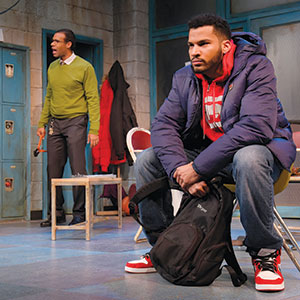

Every morning, Dez (Christian Thompson) changes out of his red and black high-top kicksreplacing them with a pair of work boots at the automobile factory where he works. As he puts them away in his locker, he checks for smudge marks then wipes them off with his thumb.
His co-worker Shanita (Tristan Cunningham) brings in a giant bottle of ranch dressing and writes her name on it before she places it on a shelf in the breakroom fridge. She’s visibly pregnant, and although she denies it, the dressing must be satisfying one of her hunger cravings. Faye (Margo Hall), who’s worked at the factory for almost 30 years, is still sneaking cigarettes despite everyone’s urging her to quit.
In a lesser production of Dominique Morisseau’s Skeleton Crew, these idiosyncrasies could come across as quirky, or worse, provide the actors with an excuse to overemphasize their characters’ individuality. Instead, these details inspire fully-formed and lived-in performances by the entire cast of this TheatreWorks Silicon Valley production, now playing at the Lucie Stern Theatre.
And, under Jade King Carroll’s steady direction, the actors achieved a kind of harmony that’s rare. Audiences who attend the play in Palo Alto are benefitting from its run earlier this year at the Marin Theatre Company, which co-produced the drama. Three months in and, like the cars Dez, Shanita and Faye are assembling, Skeleton Crew is a dynamic, well-oiled machine.
Morisseau sets the play in only one placethe workers’ breakroomand yet, the production never feels confined. Scenic designer Ed Haynes lends the atmosphere an authentic feeling of decay by rounding up an ancient microwave and refrigerator, rusting lockers and a patched-up sofa. During the entr’actes, the projections designer, Mike Post, casts black-and-white images of cars being built on old factory lines. Because the images get abstracted when they’re projected against the entire set, they become menacing. Especially when paired with an instrumental soundtrack that groans and whirrsthe sounds of a mechanized society grinding itself down.
In this room, in fleeting respites from their daily, Sisyphean tasks, the three union co-workers and, from time to time, their foreman Reggie (Lance Gardner) drink coffee and gossip about each other and the job. The central conflict begins when Reggie confesses to Faye that the factory is due to close at the end of the year. Their relationship is complicated. Faye is not only the union steward; she was also his late mother’s best friend. Faye’s loyalties are divided between the workers she represents and the man she considers to be, if not a son, then like family. On the verge of retirement herself, she’s torn about trusting Reggie to fight for their jobs.
In 2017, Margo Hall was in top form as a goddess made human in Marcus Gardley’s black odyssey (Cal Shakes), and as a movie star slumming it for the sake of art in Robert O’Hara’s Barbecue (SF Playhouse). But as Faye, Hall is commanding in a quieter way. The role itself is not showy. Morriseau knows how to imply melodrama without typing it out verbatim in the script. Faye is level-headed, but she’s had some tough breaks and made some serious mistakes. Hall’s imagination lights up the stage with her version of a proud, occasionally unlucky, yet ultimately shrewd woman like Faye.
Thompson and Cunningham are also terrific as Dez and Shanita, respectively. They flirt and circle each other reluctantly, both at first unsure of their feelings for each other. Cunningham, in particular, delivers her lines with an unexpected lyricism. Somehow, in the midst of all this decline, the actress finds poetry in her character’s ability to love. As the foreman caught between management and his employees, Gardner constructs Reggie from equal parts frustration, rage and vulnerability.
Skeleton Crew takes place in Detroit at the beginning of the recession in 2008. As the auto industry fell apart, so did the city. The playwright references abandoned buildings and neighborhoods, and the attendant rise in crime. These three factory workers are barely hanging on, but it’s not just their livelihoods that depend on the place staying open. The plantand all the others like itis the backbone of Detroit’s economy. Once it collapses, the city, already in a state of disrepair, will too.
Skeleton Crew
Thru April 1
Lucie Stern Theatre, Palo Alto
theatreworks.org


